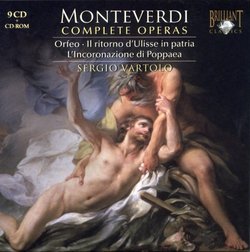| All Artists: Monteverdi, Vartolo Title: Monteverdi: Complete Operas Members Wishing: 0 Total Copies: 0 Label: Brilliant Classics Original Release Date: 1/1/2010 Re-Release Date: 2/9/2010 Album Type: Box set Genre: Classical Style: Opera & Classical Vocal Number of Discs: 9 SwapaCD Credits: 9 UPC: 842977039054 |
Search - Monteverdi, Vartolo :: Monteverdi: Complete Operas
 | Monteverdi, Vartolo Monteverdi: Complete Operas Genre: Classical Monteverdi's three great operas (a fourth, Arianna, only survives in part) are among the earliest surviving examples of opera, and are still regular fixtures on the international operatic repertoire. Orfeo was composed in... more » |
Larger Image |
CD Details
Synopsis
Album Description
Monteverdi's three great operas (a fourth, Arianna, only survives in part) are among the earliest surviving examples of opera, and are still regular fixtures on the international operatic repertoire. Orfeo was composed in 1607, and performed that year during the carnival in Mantua. Not only is Orfeo the earliest opera in the repertoire, it was also one of the grandest of its time. The forces called for by Monteverdi are impressive. Harpsichords, two chittarone, double harp, pipe organs, strings (including violini piccoli), cornets, recorders, sackbuts and trumpets. The tonal color this orchestra produced enabled Monteverdi to create atmospheres and moods in the drama unfolding on stage previously undreamed of by his contemporaries. Il riturno d'Ulisse in patria was first performed in 1641. Monteverdi had to cope with an uneven libretto, but his music is extraordinarily rich. The way in which Monteverdi characterises the roles provides them with greater depth -- a move away from the 'stand and deliver' style of delivering an aria prevalent at the time. L'Incoronazione di Poppea was premiered in 1642. It was the first opera to deal with historical events rather than a legendary theme. The themes of political ambition and love dominate the action. Nero and Poppea represent these passions, while the traditional values are represented by the losers in the plot -- Seneca, the betrayed queen Ottavia, and the lover Ottone. The subject matter was daring for the period, as censorship was just being eased somewhat. Monteverdi pushed to the limits what was allowable in his opera of lust, greed and power contrasting with the traditional moral code. New recordings by an all Italian cast, with a period instrument ensemble. Booklet notes and libretti on a CD-ROM included with the 9CDs An ideal introduction to Monteverdi and his operatic masterworks.
